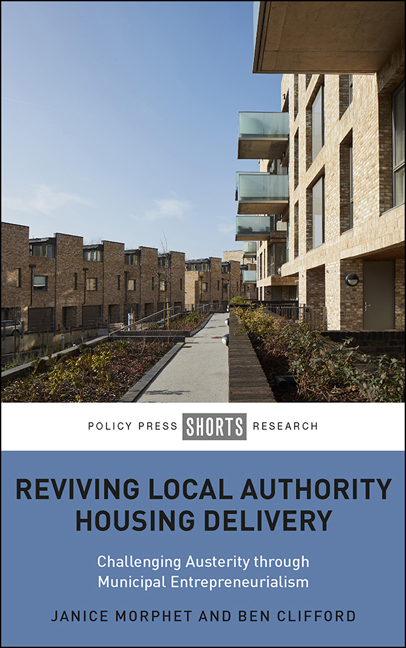 Reviving Local Authority Housing Delivery
Reviving Local Authority Housing Delivery Book contents
- Frontmatter
- Contents
- List of Figures and Tables
- Preface
- One Introduction: Local Government in England and the Twin Crises of Austerity and Housing
- Two Local Government, Housing and Planning in the UK: a History
- Three Challenging Austerity: Why Have Local Authorities Been Taking Their Own Action?
- Four Overcoming Austerity Effects Through Local Authority Direct Action?
- Five Austerity’s Legacy: Risk, Opportunity and a New form of Central– Local Relations?
- References
- Index
Two - Local Government, Housing and Planning in the UK: a History
Published online by Cambridge University Press: 18 March 2021
- Frontmatter
- Contents
- List of Figures and Tables
- Preface
- One Introduction: Local Government in England and the Twin Crises of Austerity and Housing
- Two Local Government, Housing and Planning in the UK: a History
- Three Challenging Austerity: Why Have Local Authorities Been Taking Their Own Action?
- Four Overcoming Austerity Effects Through Local Authority Direct Action?
- Five Austerity’s Legacy: Risk, Opportunity and a New form of Central– Local Relations?
- References
- Index
Summary
Introduction
The role and history of local government in the UK are inextricably linked with housing provision and delivery in its administrative areas (Reeves, 2006; Chandler, 2010). The period since 1980 within which local government's housing role was lessened and almost removed, particularly in England, has been important in understanding how its position has been undermined and reduced as viewed by local political leaders as well as the community (Dunleavy, 1984; Cochrane, 1991). This change in the real and perceived level of strength of local government through the removal of the housing function was intentional and meant to reduce the centrality of local government's relationship to its community and its local spending power (Stoker, 1988; Kelly, 2007; Rhodes, 2018). As the proponent of this change, the- then Prime Minister Margaret Thatcher intended to undermine much of local government's core support from Labour voters (Jessop et al, 1988; Evans, 2018). Yet the history of local authority provision of housing demonstrates that it has always been a contractual relationship offered by government and its removal was also part of the government's obligations to meet international treaty obligations (Morphet, 2017). In this chapter, this contractual relationship is considered as are the ways in which housing formed the basis of local government's place in the local community (Wills, 2016).
Housing responsibilities have given local authorities legitimacy in central– local debates and negotiations (Rhodes, 2018). In working to restore their role as housing providers, local authorities are seeking to fundamentally renegotiate their position within the state. In this chapter, we consider the history of local government's involvement in housing provision. Much of this history is UK- wide; however, following devolution, there have been some notable differences in housing policy between the nations of the UK in recent years (McKee et al, 2016), and our focus for the remainder of this book is on England. In Scotland (McKee, 2010) and Wales (Smith, 2018), housing provision by local authorities has continued and RTB provisions have been removed. In Northern Ireland, the public provision of housing is through the Housing Executive (Paris and Frey, 2018).
- Type
- Chapter
- Information
- Reviving Local Authority Housing DeliveryChallenging Austerity Through Municipal Entrepreneurialism, pp. 33 - 58Publisher: Bristol University PressPrint publication year: 2020
